In Episode 190 of the Overthinking It Podcast, Fenzel and Wrather brought up two different but related ideas about The Bible and its influence on subsequent works of literature. Fenzel cited John Guillory’s idea of poetic authority, which posits that many works of literature strive to supplant, support, sustain or otherwise build upon the role of Scripture as a literary operation. They attempt to imitate the relationship between the poetic language of The Bible and the Authority it implies in order to imbue their own works with that feeling of importance. Wrather cited The Bible’s heteroglossic discourse: the way that many different voices, languages, and types of stories (everything from legal documents to erotic poetry) all got bundled up between two covers and are considered part of the same Text, in spite of their often jarring dissonances.
Both of these were discussed mostly in the context of Ghost Rider: The Spirit of Vengeance (we’re using a liberal definition of the word “literature” here, people), but Fenzel gave an interesting example of another text that exhibits both the poetic authority and the heteroglossic discourse of The Bible: Terminator 2: Judgment Day.

“Get thee behind me, Satan. Hasta la vista, baby.” Matthew 16:23
Naturally, my interest was piqued. (If you’re new around here, you should probably know that I fancy myself as something of a Terminator expert.) No, it wasn’t because I felt like my beloved Favorite Movie of All Time was being disparaged and needed defending. Far from it. Instead, I saw a great opportunity to deepen my understanding of a movie that I’ve seen literally dozens of times by examining it through these previously unexplored concepts of poetic authority and heteroglossic discourse. Even if this exercise makes me question my faith fandom in the divine nature of the greatest book ever written, The Bible the awesome nature of the greatest action movie ever made, Terminator 2.
Are you with me? Good. Come with me if you want to exegete.
Poetic Authority
When I say that T2 imitates “the poetic language” of The Bible, I don’t mean poetic in the “There once was a man from Nantucket” (i.e., dirty limerick with rhythm and rhymes) sense. I say it more in the sense that it’s epic and laden with meaning and importance, like The Bible. And T2 is nothing if not epic and laden with meaning and importance. A lot of the ways it does this will be obvious to anyone who’s seen this movie, but let’s restate them for the purpose of this analysis:
The Almighty
The Lord God reigns over all events in The Bible and is the purported divine inspiration for the human authors of the story.
James Cameron, even before he proclaimed himself “The King of the World,” became widely known (feared) as a God-like figure who exerted His absolute control over movies and brought impossible (miraculous) things to reality through His relentless drive and groundbreaking special effects (divine powers).
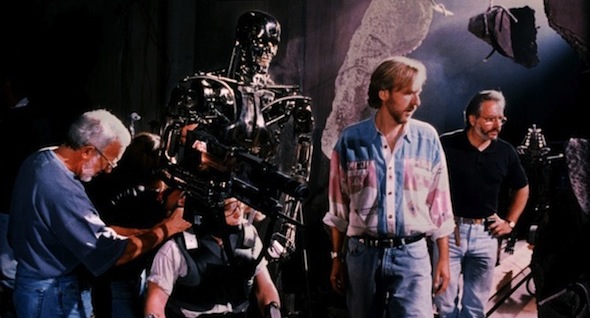
“I am the Alpha and the Omega.” Revelation 1:8
Cameron’s looming presence over T2 is obviously metatextual, but it’s still integral to the importance of T2 in the popular imagination in the same way that God and ongoing activities of His Church are integral to the importance of The Bible.
Judgment Day
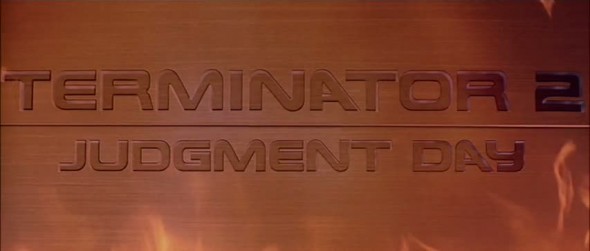
“But because of your stubbornness and your unrepentant heart, you are storing up wrath against yourself for the day of God’s wrath, when his righteous judgment will be revealed.” Romans 2:5
Although the event “Judgment Day” doesn’t actually occur in the movie, it’s constantly referenced by the characters as the collective punishment for man’s sins, both specific ones like building nuclear weapons and handing control of them over to computers, as well as more general ones like our innate predisposition to violence.

“Cain attacked his brother Abel and killed him.” Genesis 4:8
Battle Between Good and Evil for the Fate of Mankind
It’s not just that good and evil are battling; it’s that the stakes are as high as they can be within this worldview. In The Bible, Good and Evil fight over the fate of men’s souls. In Terminator 2, Good and Evil fight over their respective rights to exist.
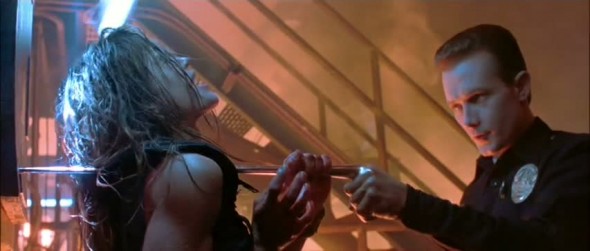
“He was given power to make war against the saints and to conquer them.” Revelation 13:7
Revelation and Conversion
Sarah Connor and the T-101 both act as prophets that preach an apocalyptic gospel. They gain an important convert who tosses aside his life’s work based on his newfound faith:
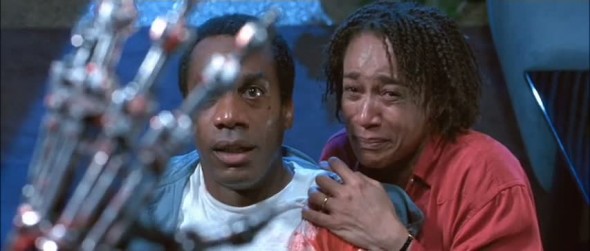
“As Saul neared Damascus on his journey, suddenly a light from heaven flashed around him.” Acts 9:3
The Ultimate Sacrifice
I think this one is pretty self-explanatory.
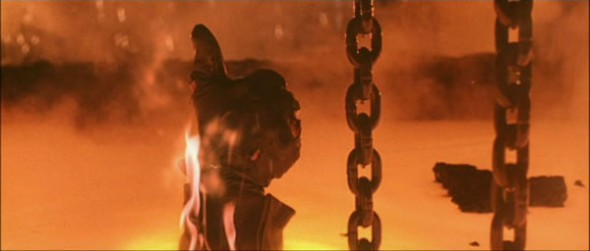
“And at the ninth hour Jesus cried out in a loud voice, “Eloi, Eloi, lama sabachthani,”–which means, ‘I need a vacation.'” Mark 15:34
Commandments
“Love thy neighbor.” “Keep holy the sabbath day.” As The Bible gives us explicit commandments for living a just live, so does Terminator 2:
“The future is not set. There is no fate but what we make for ourselves.”

“And he wrote on the tablets the words of the covenant, the Ten Commandments.” Exodus 24:28
“I swear I will not kill anyone.” / “If a machine can learn the value of human life, maybe we can too.”
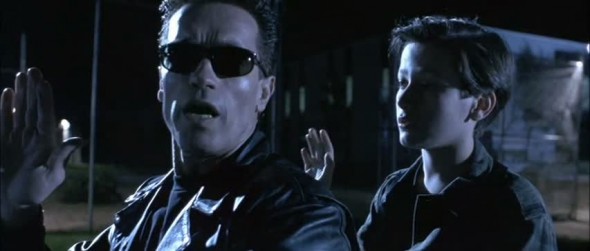
“Thou shalt not terminate.” Exodus 20:13
As obvious as these parallels may seem, it’s important to keep in mind that these “poetic” elements are essential to the movie and intentional storytelling choices that set T2 apart from other mainstream action movies. Plenty of them share these elements, but plenty don’t. Aliens, James Cameron’s other famous sci-fi extravaganza, has demonic villains and a virtuous heroine, but the stakes aren’t nearly as high as they are in T2, and there are no preachy life lessons (unless you interpret “Get away from her, you bitch!” as an exhortation to dedicate your life to protecting little girls from monstrous female creatures).
Even Rise of the Planet of the Apes, which is both a story of the apocalypse and a cautionary tale, lacks an Ultimate Sacrifice and the Commandments that directly instruct us not to, um, mistreat our chimpanzees and perform unauthorized gene therapy experiments. Those messages are of course unambiguously present, but they’re not carved into hard surfaces, sworn upon, or recited in the way that one might recite Scripture.
About that. Given the context we’ve described, listen to this clip of John Connor reciting the “no fate” saying that Sarah taught her:
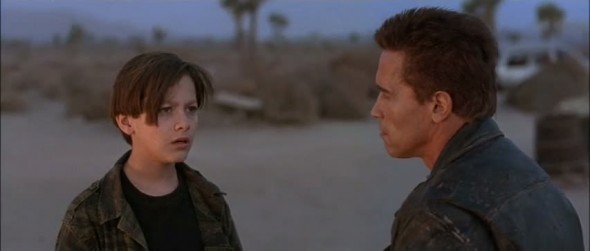
And consider that fans of the short-lived Terminator: Sarah Connor Chronicles TV show adopted “no fate but what we make” as their rallying cry when trying to save it from cancellation:
Of course they recite it like it’s holy writ. Per the theory of poetic authority, James Cameron made T2 in a way that deliberately echoes The Bible’s epic storytelling and sense of meaning and authority. And He succeeded in a big way.
Heteroglossic Discourse
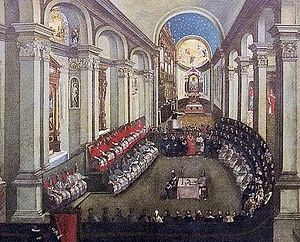
In a way, the Council of Trent is like Comic-Con. A bunch of people get together and debate what’s canon an what isn’t.
T2 succeeds in imitating The Bible in another, albeit very different way: both are rife with heteroglossic discourse. Although The Almighty successfully infused His text with epic storytelling, authority, and importance, the text is spoken through multiple voices that sometimes say contradictory things.
In the case of The Bible, these issues have been analyzed exhaustively and are still hotly debated. Read the Wikipedia article if you’re new to this issue, but here’s a quick summary to get us all on the same page: not only was The Bible assembled from a wide range of different texts (legal documents, erotic poetry, etc.) written by different authors over thousands of years, they were repeatedly mistranslated, augmented, and cut by editors with competing agendas and interpretations of scripture. The results are, among other things, numerous intertextual inconsistencies in The Bible. Some of them are huge and related to the central themes of the text (vengeful Old Testament God vs. forgiving New Testament God/Jesus); others are more picayune (conflicting genealogies of Jesus in Matthew and Luke).
T2 obviously doesn’t suffer from the issue of multiple authors over millennia–James Cameron is pretty much the closet thing there is to an auteur in big budget movie-making–but it does suffer from the issue of competing and sometimes contradictory voices. And as is the case with The Bible, some of these issues are intertextual, while others are metatextual.
Narration

This is the most literal example of T2’s inconsistent voice issue. Sarah Connor’s ominous narration occurs five times in T2, and in each instance, she seems to be narrating from a slightly different vantage points, both temporally and thematically:
(1) In the beginning, Sarah describes Judgment Day, the War Against the Machines, the Terminator sent back in time to kill John, and the “lone warrior” sent back in time to protect John. She delivers this factual exposition in a dispassionate, emotionless way, and she speaks in the past tense, so her vantage point seems to be a time significantly removed from the events of T2.
(2) In the middle, after the group has escaped to the desert, Sarah realizes that the T-101 would make a great dad for John, which gives her a clear conscience to go on the risky mission to assassinate Miles Dyson and leave him in the care of the T-101. Her tone seems more caught up in the emotion of the moment and less detached from the events compared to the introduction. But more importantly, she later realizes that her assassination plot was the Wrong Thing To Do, not the “sanest choice”. Bad Sarah. So is this narration meant to be in the present tense, before she realizes her mistake?
(3) After the failed assassination attempt, Sarah describes how the T-101 clues Dyson in on Judgment Day and how Dyson “took it pretty well,” considering he was just told he was responsible for Skynet and nuclear holocaust. Which is immediately followed by Dyson saying, “I feel like I’m gonna throw up.” This is an ambiguous case: the irony could be intentional, or it could be the product of Sarah once again narrating from inside the moment as opposed to looking back on events.
(4) Leading up to the raid on Cyberdyne, Sarah describes her newfound uncertainty over the events of the future. Perhaps the horrible fate of Judgment Day is avoidable, after all. This too, is ambiguous in terms of whether or not she’s narrating from the moment.
(5) At the very end, Sarah describes her newfound hope for the event of the future, inspired by, of all things, the Terminator that learned the value of human life. But she refers to an “unknown future,” which again suggests that she’s more in the moment–immediately after the events of T2, in whatever car is scooting away from the factory–as opposed to the first narration, which seems to come from a time further removed from the events.
So not only is Sarah’s voice inconsistent with itself, at one point it becomes directly inconsistent with the rest of the message of the movie, which ostensibly comes from James Cameron’s voice. Which brings us to the less literal, but ultimately more interesting issues around inconsistent voices and messaging.
Violence
John Connor’s voice commands the T-101 to not kill anyone. The T-101’s voice swears to not kill anyone. Sarah’s narration says that a Terminator has learned the value of human life.
But other voices–that of the camera, the action on screen directed by James Cameron, and the actions of The Terminator–says something that does not fit well with these pacifist voices.
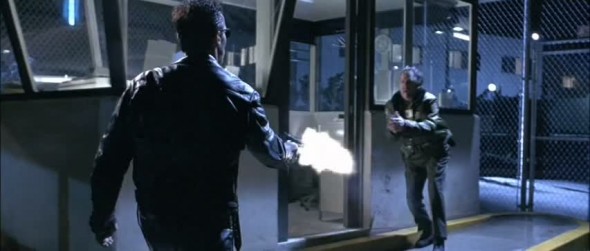
This poor security guard may not be not dead, but he’ll likely be psychologically traumatized by the incident and may possibly have lasting damage to his knee/leg.
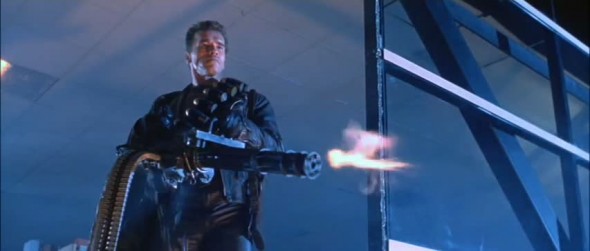
The cops on the other end of this machine gun attack may not be dead, but millions of dollars worth of state property certainly are.
And for god’s sake–it’s a CHAIN FED MACHINE GUN. No amount of preaching on the virtues of non-lethal methods of solving disputes is going to overcome the awesome power of a CHAIN FED MACHINE GUN and its accompanying message that Overwhelming, Violent Force Gets Results.
Is it “an eye for an eye, a tooth for a tooth” (Exodus 21:24), or is it “turn the other cheek” (Matthew 5:39)? Are the Jews the “chosen people” (Deuteronomy 7:6), or is there “no difference between Jew and Gentile” (Romans 10:12)?
Heteroglossic discourse, folks. It’s both!
Technology
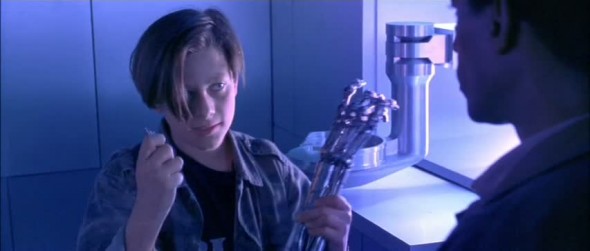
Within the text, T2 has an uncomfortable relationship with technology. One voice of the film says that the mistake was relying on technology to make decisions instead of humans. As the T-101 puts it during one of his exposition scenes, “Human decisions are removed from strategic defense” during the build up to Skynet’s takeover. But another voice of the film says that the technology itself–Dyson’s chips and software–are the problem, and that physically destroying those and preventing any further work along those lines will prevent Judgment Day. By the end of the movie, the luddite voice wins the day: no one ever talks about the lapses in human decision making that opened the door for technology to ruin us. They only talk of the ruining effect of the technology itself.
Outside of the text, T2’s relationship with technology becomes even more problematic, since James Cameron relied on the most advanced computer power available at the time to make this movie possible. In the words of the late, great, David Foster Wallace:
A movie about the disastrous consequences of humans relying too heavily on computer technology was itself unprecedently computer-dependent. George Lucas’ Industrial Light and Magic, subcontracted by Cameron to do T2’s special effects, had to quadruple the size of its computer graphics department for the T-1000 sequences, sequences which also required digital-imaging specialists from around the world, thirty-six state-of-the-art Silicon Graphics computers, and terabytes of specially invented software programs for seamless morphing, realistic motion, digital “body socks,” background-plate compatibility, congruence of lighting and grain, etc.
The even greater irony is what happened after T2: movie-makers have become increasingly reliant on computer effects-driven spectacles and put less effort into storytelling and character development.
Rise of the Machines, indeed.

Conclusion
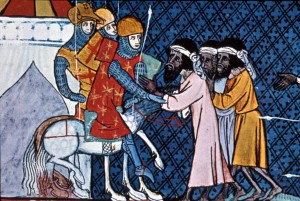 To tie everything together, let’s go back to The Bible and its competing attitudes towards violence. On one hand, The Bible condones violence and glorified the Israelites’ victories on the battlefield. On the other hand, The Bible condemns violence and glorifies the forgiveness of enemies. Over the centuries, those claiming to be inspired by The Bible have been unable to reconcile these contradictory voices and ultimately chose various forms of violence and war to spread the Good News. Christianity came to dominate the western world, but at the cost of undermining the pacifist elements of The Bible.
To tie everything together, let’s go back to The Bible and its competing attitudes towards violence. On one hand, The Bible condones violence and glorified the Israelites’ victories on the battlefield. On the other hand, The Bible condemns violence and glorifies the forgiveness of enemies. Over the centuries, those claiming to be inspired by The Bible have been unable to reconcile these contradictory voices and ultimately chose various forms of violence and war to spread the Good News. Christianity came to dominate the western world, but at the cost of undermining the pacifist elements of The Bible.
But at the end of the day, in spite of its conflicting messages and questionable legacy, The Bible retains its influence and status as a sacred text because, well, it’s doing something right. Its multiple, occasionally dissonant voices come together to faithfully and powerfully reflect the human condition. They speak to our desire to understand our world in terms of Good versus Evil, our desire for structure, our desire for heroes and saviors. Poetic authority. They also reflect our own squabbling and contradictions, our diverse voices and points of view, and our own flawed and messy ways. Heteroglossic discourse.
Likewise, T2 and its poetic authority are made more powerful because of–not in spite of–the movie’s contradicting, dissonant voices and themes. In short, it lets us have our cake (cathartic destruction and technological wizardry) and eat it too (pacifist philosophy and fear of technology). T2 gets away with this when other movies might not be able to because, well, James Cameron is doing something right. Whenever I try to explain the appeal of this movie, I always come back to the scene at the end when the T-101 says goodbye to John Connor:
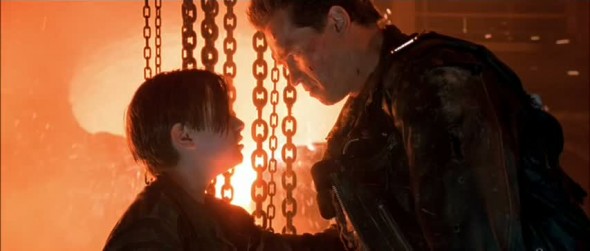
“I know now why you cry, but it is something I can never do” is cornball and hokey. (So is “love is patient, love is kind,” by the way. But I digress.) But it works because we’ve had our thematic cake and eaten it too, and because James Cameron, through a combination of competent exercise of his craft and inspired artistic touches, has convinced us to care deeply for these characters and for what they’re doing for the future of all mankind.
I say these things not as a fanboy’s knee-jerk reaction to insinuations of weakness of a beloved text, but rather as a careful observer’s assessment of a beloved text. T2 may not be unassailable gospel. The Gospel with a capital G is far from unassailable. But that fact doesn’t make either Terminator 2…
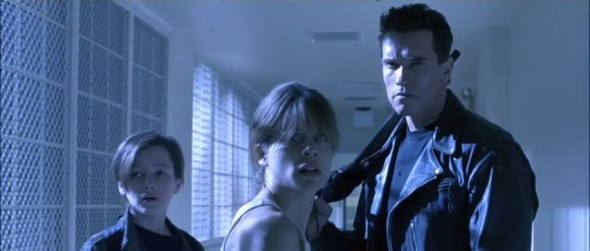
…or The Bible…

any less of an exquisite expression of the human condition that few other works of literature are able to match.
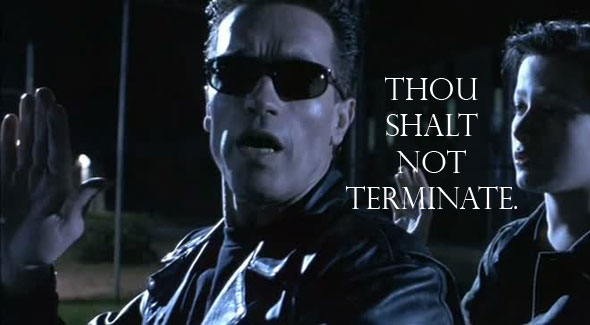
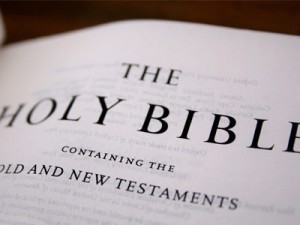
The term “pacifism” is not compatible with the theme of the old testament. The theme of the Old Testament is “repent or die”. The theme of the new testament is “repent or die an infinite amount of deaths for all of eternity”. The New Testament reinforces The Old Testament. The New Testament may not feature as direct warnings by God as in The Old Testament. Luke records Jesus saying “wisdom is justified of all her children.” in Luke 7:35. Who is this wisdom? Solomon records Woman Wisdom say “I also will laugh at your calamity; I will mock when your fear cometh;” in Proverbs 1:26. In Luke 6 Jesus tells his people to be kind to their enemies, and what kinder thing is there than to tell their enemies that they are going to burn like those whose bodies were, in the old testament, incinerated by God himself in various instances, but in the New Testament is made known that they will not die, but lay in “wells without water,[and] clouds that are carried with a tempest; to whom the mist of darkness is reserved for ever”? The “pacifist” Jesus says “Depart from me, ye cursed, into everlasting fire, prepared for the devil and his angels:”
Go to Revelation 19 to read about how Jesus while on a war horse, wearing a cape dipped in blood, and with a sword jutting out of his mouth, kills everyone on earth who killed his servants. God is a jealous God(exodus 20), who seeks vengeance(Isaiah 63) and justice for the act of cosmic treason of all people(Romans 3:23) even unto the ending of the world. Repent, then, and turn to God, so that your sins may be wiped out. Acts 3:19
Lee, loved this. Your best work yet.
Kantarky, it looks as if you’re cherry-picking quotes to prove your point. It’s widely known Jesus also said “love thy neighbor as thyself.” Perhaps it’s a mistake to gloss over the entirety of the New Testament as “pacifist,” but it was a generalization I was willing to ignore because it supported the premise without being wholly incorrect. The Gospel, and Jesus’ teachings about interacting with your fellow humans on earth, fall far more into the vein of pacificism than many parts of the bible, including the new testament. However, the overall point was that the bible is heteroglossic… and your mentioning of several various books in the bible casting Jesus in such a different light (as your reference to Revelations) actually supports the idea of the bible as a heteroglossic entity.
I think we can distinguish between heteroglossia (which is to say, contradiction: we infer “different tongues” from inconsistency) and complexity. I can support eating poutine in general without wanting to eat it right now for breakfast. It’s undeniable that the Bible is long and complicated, but “contradictory” is a very high bar to pass, particularly when you’re dealing with a work that deals so largely in symbolic and figurative language.
That makes sense to me, and far more concise than I was. :)
Quite possibly the best thing I read on the internet so far today.
Parts of scripture cut what? http://www.youtube.com/watch?v=780llTKt3uM
Your analysis could easily be transferred to the overarching whole of all the movies and the television series together, as I know you know. The ret-conning of some dates and such in T:S, for example, could in centuries to come simply be another example of the intertextual contradictions.
But then that leads to a weird question. If the ending of T:S hadn’t been changed, who would have been the figure making the Ultimate Sacrifice? The T-101, or John Connor? (And the fact that it was changed, that’s another example of the struggles over representation and the debates over what should and should not be canonical that very well can lead to the internal contradictions.) Or or or! As it was released officially, does that mean it’s Marcus? Or do we relate one more to, say, Abraham, and the other to Jesus? Or are Abraham and Jesus the same, and thus so too are Connor and any terminators?
Lee, as far as I’m concerned, you’re the Pope of the Terminator series, so I’ll take whatever you come up with as doctrine.
Nah. The Pope of the Terminator series would be whoever has ostensible control over the franchise as a formal institution, which would be Megan Ellison (daughter of Oracle founder Larry Ellison). In this analogy, I’d be more of a crazed Biblical scholar at a niche divinity school. Though I am flattered by the comparison!
The original terminator movie wrecks everything making the rest of the movies comprehensive trash.
Well – just think : well if the films would make sense then how could someone from the future be John Connors dad – it simply wouldn’t actually work.
As for the holy scriptures – the holy scriptures tell us god’s real name is amen omroe and his son was Jesus christ ( the son of man ) and the mother Mary was the mother of the Devine spirit light.
Most people just don’t do things they don’t want done to them nor do they tolerate bad actions – basically the universal law of karma